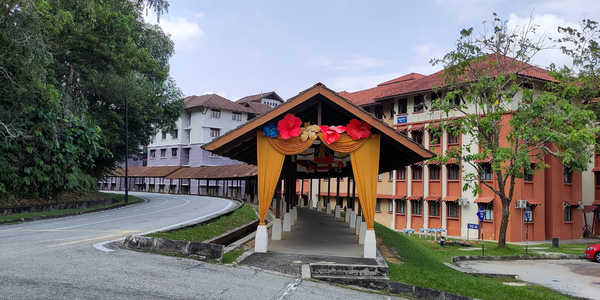In addition to the countless positive aspects and opportunities that studying in a foreign country offers, one hurdle can seem almost unconquerable: the language. This is exactly what I was thinking about when I was faced with the decision of whether South Korea would be a good destination for me. In this post, I describe why the language barrier is actually much smaller than it initially appears.

What does it mean to live in a country without being able to speak the local language?
A foreign language often means having to familiarise yourself with new tones, confusing grammar and unfamiliar sounds. But some language families put one more thing on top and use their own characters, such as the Korean language. The result is that it becomes even more difficult to decipher addresses and signs! The lack of language skills is most noticeable in everyday life: simple things like shopping, ordering food, using public transport and accessing health services become a challenge.
In most universities there are courses that are held in English, but it can also happen that precisely those courses that are particularly interesting or useful are not available in English. I was also unable to attend two courses because they were only offered in Korean. Unfortunately, not being able to speak Korean does limit the choice of courses. Nevertheless, I didn't want to let this stop me, as there were still plenty of English-language alternatives available.
Want to improve your language skills before spending a semester abroad? Then take a look at the language learning programmes at TU Graz now!

How you can still communicate in any country in the world
There is a language that everyone in the world understands, regardless of the country they are in: Body language! It is fascinating how universal facial expressions and gestures can be. Pointing at things, simple hand movements and facial expressions can replace long, complicated sentences. Even in different cultures, similar gestures are often interpreted in a similar way. A smile, a sceptical look or a raised eyebrow can convey emotions without saying a word. Anyone who has ever found themselves in a situation where they are unable to communicate will probably have instinctively used this type of communication in order to be able to make themselves understood.
This basic communication is therefore almost always possible, but it is of course limited to the simplest content. In the 21st century, however, there is modern support to be able to communicate much more extensively.

Digital support: modern translation apps
Nowadays, there are countless apps that make communication much easier. We're not talking about primitive dictionary apps here: In recent years, apps that can recognise and automatically translate text in photos have become established. Another option is a "conversation mode" in which the conversation partners speak to each other in their respective languages. The app translates automatically and the translated sentences are played in the foreign language via the loudspeaker - super easy! The best-known example of this is the Google Translate app. It offers all the functions mentioned above and there is also the option of downloading languages for offline use. There is also the Papago app for Korean, which offers the same functions but delivers subjectively better translations. With the help of these apps, it is now also possible to understand or communicate more complicated content in a foreign language!
New friendships
As part of the international student body, you will meet many new people during your semester abroad and soon make a few friends. Very often there are also other students who can speak the local language! Especially at the beginning of my semester abroad, one of these new friends helped me a lot to find my way around the new university. These friends can also make everyday life easier, for example when ordering in a restaurant. They are also the best people to turn to in an emergency situation such as an accident or medical problem. During a semester abroad, you are almost never on your own - there is always someone who can help.

Learn the local language
Even if, as described above, it is perfectly possible to live in a country without speaking the language, it is of course an advantage to at least familiarise yourself with the most important words and phrases such as "please", "thank you" and "hello". Not only is this a form of respect, but the people you are talking to are often happy to be addressed in their own language and are then more willing to continue speaking in English or with the help of a translation app.
A semester abroad also offers the ideal environment to make very rapid progress in language learning, as the local language is usually omnipresent: from information signs and menus to conversations on the street - you are confronted with the language everywhere, which automatically creates a good learning environment. Most universities also offer cheap or even free language courses for international students. I enrolled on such a language course in South Korea and even though I wasn't able to converse with anyone after a month, I was able to introduce myself and order food in a restaurant after a few lessons. So, it's not too late to start learning languages during your semester abroad!
Language courses aren’t so much your thing, you would rather prefer to work on your speaking skills while getting to know someone from a different university? Then have a look at the Unite! Language Tandems via the university alliance Unite!, that TU Graz is part of.

Good preparation is the key. (Image Source: Element5 Digital - unsplash.com)
Leaving the comfort zone is part of the adventure
Spending a semester abroad also means that you will often find yourself in situations that are unfamiliar and foreign. It doesn't matter how well prepared you are or whether you speak the local language or not. At the same time, these are the situations that are particularly beneficial for personal development! Increased self-confidence, independence and perhaps the ability to communicate a little in a new language are the rewards when you have finally mastered these unfamiliar situations. The key is to approach a semester abroad with the right attitude, a good dose of motivation and a willingness to leave your comfort zone - then your exchange will also be an unforgettable time!





![[Translate to Englisch:]](https://www.tugraz.at/fileadmin/_processed_/b/a/csm_baju_melayu_by_Peter_Fuerlinger_bec25f974f.png)

